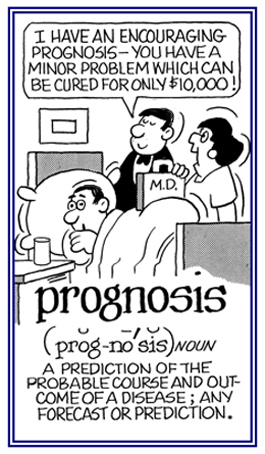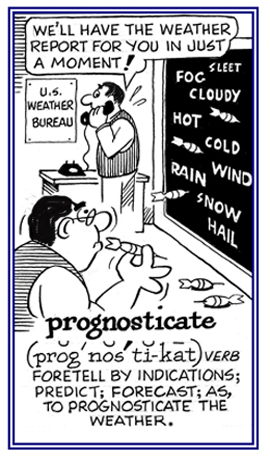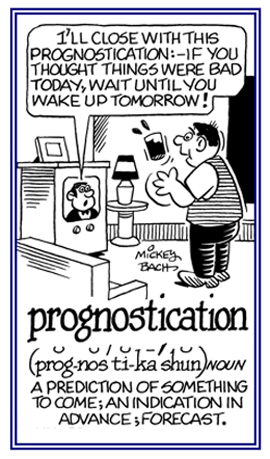pro-, por-, pur-
(Greek > Latin: a prefix signifying before; forward, forth; for, in favor of; in front of; in place of, on behalf of; according to; as, to place before; to go before or forward, to throw forward)
profusely (adverb), more profusely, most profusely
In great quantity or abundance: "Ingrid was bleeding profusely when she was brought to the hospital."
That which is extremely abundant.
1. An ancestor from the past who is related to someone who is living now: Adam is Eve's progenitor or her great grandfather.
2. Etymology: from Latin progenitor, "ancestor" from pro-, "forth" + gignere, "to produce, to beget."

© ALL rights are reserved.
Go to this Word A Day Revisited Index
2. Etymology: from Latin progenitor, "ancestor" from pro-, "forth" + gignere, "to produce, to beget."

Go to this Word A Day Revisited Index
so you can see more of Mickey Bach's cartoons.
1. Someone who is born of, begotten by, or derived from another person or parents: Many Americans are the progenies of immigrants.
2. Etymology: from Latin progignere, "to beget" from progenies, "descent, offspring" from pro-, "before, ahead, earlier than" + gignere, "to bring forth."

© ALL rights are reserved.
Go to this Word A Day Revisited Index
2. Etymology: from Latin progignere, "to beget" from progenies, "descent, offspring" from pro-, "before, ahead, earlier than" + gignere, "to bring forth."

Go to this Word A Day Revisited Index
so you can see more of Mickey Bach's cartoons.
progeria
1. Premature appearance of old age.
2. A fatal disease of children characterized by symptoms usually associated with senility.
3. A rare abnormality marked by premature aging (gray hair, wrinkled skin, and stooped posture) in a child.
4. Accelerated aging syndrome in which most of the characteristic stages of human senescence are compressed into less than a decade.
5. Etymology: derived from pro-, "before" plus the Greek word for "old age", geras; literally, "aged forward".
2. A fatal disease of children characterized by symptoms usually associated with senility.
3. A rare abnormality marked by premature aging (gray hair, wrinkled skin, and stooped posture) in a child.
4. Accelerated aging syndrome in which most of the characteristic stages of human senescence are compressed into less than a decade.
5. Etymology: derived from pro-, "before" plus the Greek word for "old age", geras; literally, "aged forward".
prognathous
1. Having jaws that project forward to a significant degree.
2. Jaws that project beyond the upper part of the face; opposed to orthognathous.
2. Jaws that project beyond the upper part of the face; opposed to orthognathous.
1. A medical doctor's forecast as to the probable outcome of an attack or disease as indicated by the nature and symptoms of the patient: Right now Karl's doctor says his prognosis is good.
2. A prediction about how a given situation will develop: For some people there is an optimistic prognosis about the economic recovery.
3. Etymology: from Greek prognosis from Latin prognosis from progignoskein, "to come to know beforehand" from pro-, "before" + gignoskein "to come to know."

© ALL rights are reserved.
Go to this Word A Day Revisited Index
2. A prediction about how a given situation will develop: For some people there is an optimistic prognosis about the economic recovery.
3. Etymology: from Greek prognosis from Latin prognosis from progignoskein, "to come to know beforehand" from pro-, "before" + gignoskein "to come to know."

Go to this Word A Day Revisited Index
so you can see more of Mickey Bach's cartoons.
prognostic
1. Relating to or acting as a prediction.
2. A forecast or prediction.
3. An omen or portent; a sign.
4. A sign of a future happening; a portent.
2. A forecast or prediction.
3. An omen or portent; a sign.
4. A sign of a future happening; a portent.
prognosticate (prahg NAHS ti kayt") (verb), prognosticates; prognosticated; prognosticating
1. To predict or foretell future events: Mary’s dream prognosticated that she was going to meet her future husband on the weekend!
2. An indication of the future result of something: Jane’s headache was hurting her and she couldn’t breathe so her doctor prognosticated that her influenza would last for quite sometime.
3. To forecast or to predict something from present indications or signs; to prophesy: The weather forecast is prognosticated to be clear and sunny for the next few days.
4. Something that presages: When people see birds appearing at the end of winter, they are believed to prognosticate that spring is coming.
5. To predict according to present conditions or signs; to foretell: There is urban renewal that currently prognosticates a social and cultural renovation for the city.

© ALL rights are reserved.
Go to this Word A Day Revisited Index
2. An indication of the future result of something: Jane’s headache was hurting her and she couldn’t breathe so her doctor prognosticated that her influenza would last for quite sometime.
3. To forecast or to predict something from present indications or signs; to prophesy: The weather forecast is prognosticated to be clear and sunny for the next few days.
4. Something that presages: When people see birds appearing at the end of winter, they are believed to prognosticate that spring is coming.
5. To predict according to present conditions or signs; to foretell: There is urban renewal that currently prognosticates a social and cultural renovation for the city.
Instead of using the verb prognosticate all the time in his essay, Jim used synonyms like "to foreshadow" and "to portend”, which made his composition more interesting.

Go to this Word A Day Revisited Index
so you can see more of Mickey Bach's cartoons.
1. A statement about what is going to happen in the future: The prognostications presented on TV about economic conditions are usually correct, but not always.
2. Etymology: from Latin prognosticationem from prognosticare "to foretell."

© ALL rights are reserved.
Go to this Word A Day Revisited Index
2. Etymology: from Latin prognosticationem from prognosticare "to foretell."

Go to this Word A Day Revisited Index
so you can see more of Mickey Bach's cartoons.
program
1. A formal set of procedures for conducting an activity.
2. To express (a task or operation) in terms appropriate to its performance by a computer or other automatic device; to cause (an activity or property) to be automatically regulated in a prescribed way.
2. To express (a task or operation) in terms appropriate to its performance by a computer or other automatic device; to cause (an activity or property) to be automatically regulated in a prescribed way.
progress, progresses, progressed, progressing (verb forms)
1. A moving forward or onward in time: "It became warmer as the day progressed."
2. To advance toward perfection or to a higher or better condition or situation: "The renovation of the kitchen has progressed very well and we are completely satisfied with the results."
3. To bring something closer to completion: "The work is progressing and it should be done today."
2. To advance toward perfection or to a higher or better condition or situation: "The renovation of the kitchen has progressed very well and we are completely satisfied with the results."
3. To bring something closer to completion: "The work is progressing and it should be done today."
"We need to continue to progress back to our hotel before it gets too late."
1. The process of developing over a period of time: Harry's parents were pleased with his progression of extraordinary musical talent.
2. A continuous and connected series of actions, events, etc.: The progression of painting the house has been going on for days, but Jack and Jill are almost finished now.
2. A continuous and connected series of actions, events, etc.: The progression of painting the house has been going on for days, but Jack and Jill are almost finished now.
prohibit (verb), prohibits; prohibited; prohibiting
To refuse to permit something to be done or to forbid by law or by an order.
prohydrotropism


